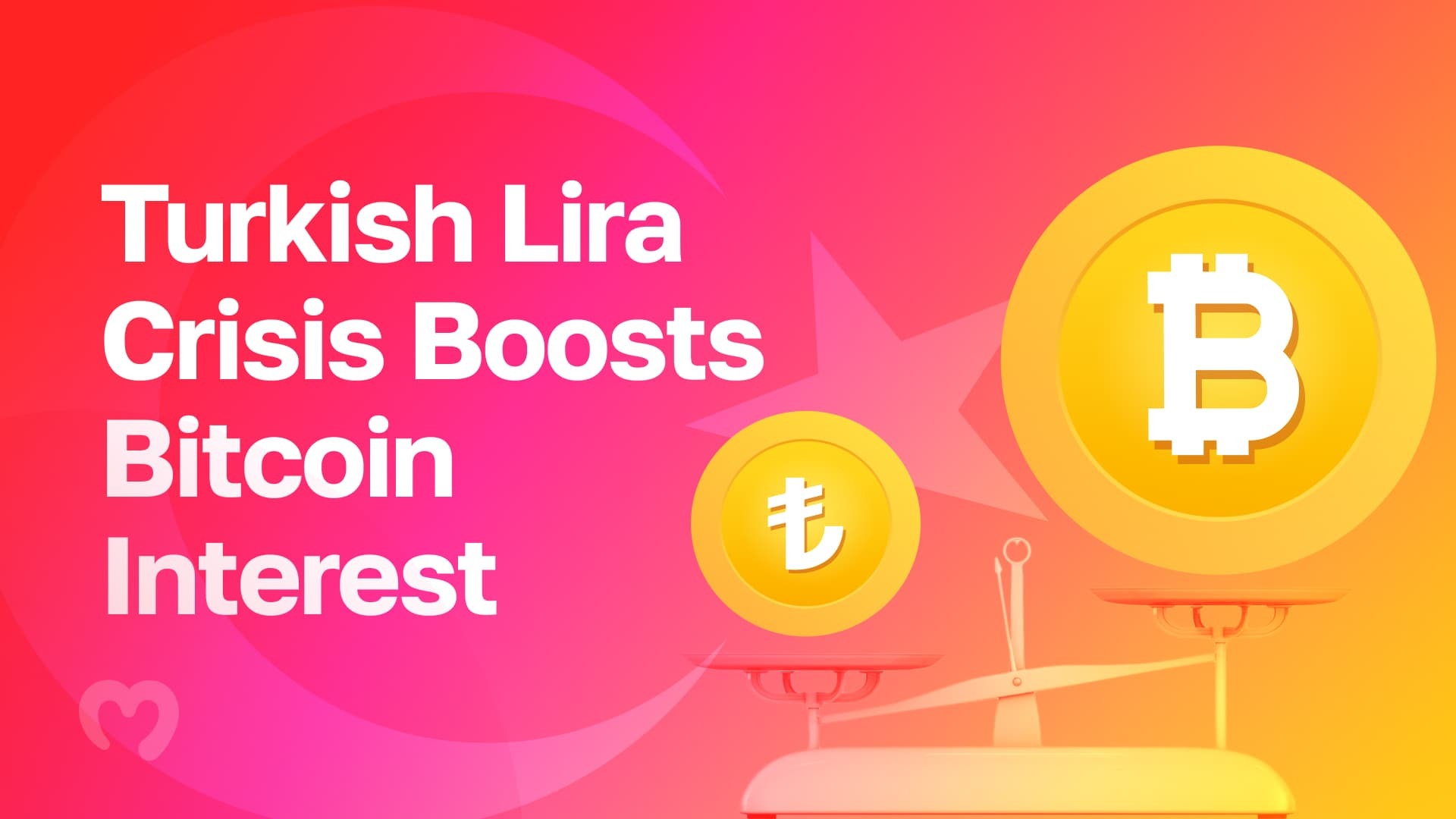Turkey ranks fourth in the world for crypto use and adoption as its citizens turn to cryptocurrencies and other assets to hedge their savings. The Turkish lira dropped to record lows in 2018 and continues the nosedive into late 2022. The exchange rate for the Turkish lira (TL) against the American dollar (USD) was approximately 4.82TL/per dollar in 2018. Now, at the time of writing, the exchange rate is approximately 18.32TL/per dollar. Will investing in crypto help reduce the risk of more loss in the future for those living in Turkey? What other strategies can they use to save themselves from the spiraling loss of value in the Turkish currency? In the following paragraphs, let’s explore why Bitcoin and other cryptocurrencies are gaining popularity in Turkey. We’ll discuss how Bitcoin helps those earning Turkish lira and what regulations look like for Bitcoin in Turkey.
Turkish Lira Inflation – Boosting Crypto Interest in Turkey
A trending Google search in Turkey since 2020 is “Bitcoin kac tl?” which translates to “how much TL is Bitcoin?”. The keyword search is indicative of the growing popularity of Bitcoin in Turkey. Even in a crypto bear market, cryptocurrencies are an attractive asset in the country. With Bitcoin and cryptocurrency regulations still unclear, Turkish people can take advantage of the perks of conveniently pulling out their profits without much concern for taxes, for now, at least.
So, what is it about cryptocurrencies that are attracting the Turkish people? Following a series of unfortunate events in 2016, the Turkish lira has been falling deeper into what seems like a rabbit hole of lira to USD decline.

There is currently a financial and economic crisis going on in Turkey. The Turkish lira is plunging in value, and inflation is at an all-time high. Borrowing costs are increasing, and as a result, more and more loans are defaulting. Some critics say the crisis was inevitable and that only a few triggers uncovered Turkey’s already messy economic policies. That said, what triggered the downfall of the Turkish lira?
What Happened to the Turkish Lira?
In 2016, a failed coup d’etat attempt in Turkey shook the population at its core. In connection with the failed attempt, Turkish officials detained American pastor Andrew Brunson with allegations of espionage. As a result, the Trump administration began pressuring the Turkish government to release the pastor. Otherwise, Trump would impose further sanctions that would potentially hurt the Turkish economy. Furthermore, Trump’s economic sanctions doubled the tariffs on Turkey. Imported steel prices rose a whopping 50%, while aluminum prices rose 20%. The increase in prices took Turkey out of American buyers’ price range. Previously, Turkish steel exports to the US amounted to 13% of Turkey’s total steel exports.
In 2021, following the already devastating economic blow from the COVID-19 pandemic lockdowns, Turkey was struck once again. The replacement of the Central Bank of the Republic of Turkey (CBRT) chief, Naci Agbal, would cause more downfall to its economy. When the new chief, Sahap Kavcioglu, took over, he slashed interest rates from 19% to 14% overnight. This brought the value of the lira down by 44% in 2021 and the lira to the USD exchange rate to 13.49.
Due to the failing economy and his unorthodox economic policies, Turkish President Erdogan’s popularity among voters and foreign investors is continuing to decline. Foreign investments in Turkey and votes for the AKP Party are also declining. With little foreign currency entering the country and the lira to USD exchange rates continuing to plummet, the immediate future of the Turkish economy isn’t looking good.
Consequences of a Deteriorating Economy
With the decline of the value of the Turkish currency and the lira to USD exchange rate, Turkish people are finding alternative assets to invest in. Furthermore, the Turkish people are becoming desperate to save their liras from melting by investing in precious metals, real estate, and other goods they can afford. Moreover, some are left without much hope as inflation and the cost of living are skyrocketing.
Consider this: Turkey’s minimum wage currently stands at around 5,500 Turkish liras. With the current lira to USD exchange rate, that’s about $275 a month. A liter of milk is approximately 17 liras, and a loaf of bread is in the ballpark of 16 liras. On the other hand, the cost of rent and utilities are exorbitant. The lowest rate for an average apartment in Istanbul is around 2,500-3,000 Turkish liras. That’s already more than half of the earnings of a minimum wage worker.
With a 14% unemployment rate in 2019, suicide rates are going up, the younger population feeling hopeless, and the elderly struggling to make ends meet as retirement funds are not covering the rising costs of living are all consequences of a spiraling economy. With the cost of living being so high and the lira being nearly worthless by the minute, devastating consequences are inevitable. As volatile as the crypto market is, Turkish people are turning to cryptocurrencies in hopes of a brighter future.
Cryptocurrency in Turkey: Why is it so Popular?
In 2020, the Google search phrase “Bitcoin kac tl”, or “how many TL is Bitcoin?” became trending on Google and continues to be a hot topic in Turkey today. Inflation, along with the deteriorating Turkish currency, makes it harder for average citizens to keep up. The rise of living costs is increasing faster than wages are. Cryptocurrency in Turkey allows citizens to gamble their Turkish currency for a digital currency that could potentially multiply their earnings.
Like many other countries, the Turkish government prohibits the use of Bitcoin and other cryptocurrencies as payments. However, trading crypto and using decentralized exchanges is still legal and remains without regulations and taxes. As such, Turks are taking advantage of 24/7 transaction capabilities, low transaction fees, and the ease of transferring funds between wallets locally and internationally. Cryptocurrencies are giving the Turkish people another chance to regain their buying power in the global market.
What are the Regulations for Cryptocurrency in Turkey?
In 2021, the CBRT issued a regulation for “crypto assets”. While the government prohibits the use of crypto in payments, it does not mention anything about the trade of crypto assets. Furthermore, the regulation prohibits the use of crypto as a payment instrument. It prohibits providing services in exchange for crypto assets. This regulation is groundbreaking in that it introduces a definition of “crypto assets” for the first time in Turkey:
“In the implementation of this regulation, crypto assets are defined as assets created virtually using distributed ledger technology or a similar technology and distributed over digital networks, but are not considered as money, fiat money, electronic money, payment instruments, securities or other capital market instruments.”
After a $2 billion fraud case involving more than 400,000 Turkish users, Turkey’s Financial Crimes Investigation Board (MASAK) published a guide on the fundamental principles of service providers. The regulation was put in place to prevent money laundering and “acts of terrorist and criminal activity” through the use of crypto.
In early 2022 after a meeting with Elon Musk, Turkish President Erdogan announced that TOGG, Turkey’s domestic car brand, would work with the AVAX cryptocurrency network. Erdogan also mentioned that Turkey aims to be one of the leading countries in the metaverse.
Have you seen our Web3 ebooks? At Moralis Academy, we have a wide selection of guides, courses, and ebooks for you to choose from. Whether you want to become an expert at Ethereum Dapp Programming or need to gain a solid foundation of blockchain technology, we’ll guide you through it all.
Blockchain and Turkish Developers
Turkish developers are some of the most enthusiastic in the blockchain space. TBV (Turkish Informatics Foundation), an independent, non-profit organization, initiated “The Blockchain Turkey Platform” (BCTR) to create a healthy blockchain ecosystem in Turkey. Through the system, BCTR aims to secure its leadership of decentralized technology in its region.
BCTR aims to expand awareness and use of blockchain technology in Turkey, research its benefits, and determine the strategic priorities by organizing training programs, hosting workshops and conferences, preparing publications, producing content, and taking part in collaborative efforts both locally and internationally. BCTR is helping to establish a bridge between lawmakers, public institutions, and regulators. Through its working group, BCTR brings together relevant stakeholders to evaluate current topics and the usage of blockchain technology.
Another organization worth mentioning in Turkey is the Blockchain Women of Istanbul (BWI) organization. It aims to boost women’s presence in the blockchain and technology spaces. The organization provides blockchain 101 courses and online webinars, development training workshops, and working groups for women. BWI also hosts meetups and events that unite men and women who support the presence of women in the IT and blockchain ecosystem.
Want to know how to make a Web3 website? At Moralis Academy, we have a collection of courses for all things blockchain and Web3. Everything you need to gain a solid foundation of crypto and Web3 is at your fingertips. Boost your knowledge of crypto terminology, or check out our blockchain guides. Explore all we have to offer and see what you can build with us!
More on Turkey and Cryptocurrency Access
Over the past two years, cryptocurrency trading in Turkey has been accelerating due to inflation and the devaluation of the Turkish currency. More and more Bitcoin ATMs are popping up around the country, especially in Istanbul. Turkish citizens can use international exchanges such as Crypto.com and Binance to buy, sell, trade, and stake cryptocurrencies. Coinbase is also available to store and convert crypto in Turkey. Local decentralized exchange platforms are also on the rise. Despite the Thodex scam in 2020 – robbing people of more than $2 billion – Turkish citizens have more reliable local exchange platforms to choose from, like BTCTurk.
Turkey has nine Bitcoin ATMs around the country in its major cities. With Istanbul hosting the most, Izmir, Antalya, and Turkey’s capital Ankara are also hosts of the system. Even though they are called ATMs, the system doesn’t quite work as a traditional ATM. Bitcoin ATMs can connect to a digital wallet, then connect its user to a crypto exchange platform. There, they can purchase Bitcoin and other cryptocurrencies by depositing cash.
Turkish Lira Crisis Boosts Bitcoin Interest – Conclusion
Overall, Turkey has a welcoming attitude toward blockchain technology, cryptocurrencies, and decentralized exchanges. Whether or not Bitcoin in Turkey and other cryptocurrencies will be used as a payment tool shortly is unclear. President Erdogan has made remarks on possibly adopting a cryptocurrency in Turkey in cooperation with its domestic car brand, TOGG. The real challenge for Turkey will be to set clear guidelines and regulations on using cryptocurrencies. Trading policies and how taxes will play a role must also be clear. While MASAK has taken steps to prevent the misuse and malicious handling of cryptocurrencies and decentralized exchanges, regulations and monitoring of criminal activities are still in development.
Furthermore, non-profit organizations such as BWI and BCTR continue to bring awareness and information about blockchain development and its significance to the region. With growing popularity and interest, these kinds of organizations provide a space for young people and older generations alike to explore all of the endless possibilities of blockchain and Web3 development. They are helping to bridge the gap between Turkish legislators and crypto users to create a safe, reliable, and easy-to-use experience for Turkish citizens. With inflation at an all-time high and the Turkish lira dwindling, cryptocurrency, being tax-free and easy to access, brings a glimmer of hope to Turkey.





